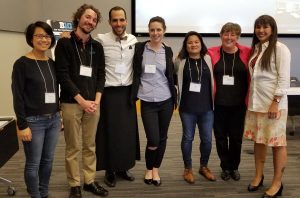Future of Research (FoR)
www.FutureofResearch.org
Championing, engaging, and empowering early career scientists with evidence-based resources to improve the scientific research endeavor.
Departmental or training program policies have a huge impact on the health, well-being, and success of graduate students and postdocs, as well as on the scientific endeavor. So, Future of Research convened experts and early career researchers to define 6 major policy guidelines and 3 excellence tiers for STEM departments:
The Department…
| Not Implemented | Bronze | Silver | Gold | |
|---|---|---|---|---|
| Supplemental Mentoring Support | Encourages more mentors in addition to the PI or does nothing. | Expresses expectation that trainees find, and that professors provide, additional mentorship. | Requires 1 co-mentor in addition to the PI or thesis committee to oversee the trainee’s progression and address personal and professional needs. | Requires the creation of a mentoring committee to oversee trainee progression and address personal and professional needs. Regularly assesses how well committee meets individual mentoring needs. |
| Peer Support Cohorts | Provides no formal organization of peer cohorts. | Groups incoming trainees into peer cohorts and organizes social events for interaction and networking. | Pairs incoming trainees with at least one other, more senior peer mentor in the department. | Groups all incoming trainees into small Peer Mentor groups. The department has a trained facilitator on staff to conduct regular peer mentor meetings. |
| Required Mentor Training | Encourages PIs to take mentor training or does nothing. | Requires all PIs to take mentor training at least once before supervising PhD or postdoctoral trainees. | Requires all PIs take recurring mentor training. Data on mentor training is publicly available to trainees. | Requires all PIs, lab personnel, and trainees in supervisory roles to take recurring mentor training. |
| Anonymous Exit Interviews | Encourages some form of anonymous exit survey or does nothing. | Collects data from required anonymous exit surveys and uses it for departmental improvement. | Makes summary data from anonymous exit surveys publicly available and disseminates it to incoming trainees. | Collects alumni data in follow-up surveys (e.g. 2 years later). Exceptional service and mentoring are rewarded. Patterns of harmful behavior are addressed. |
| Clear Guidelines and Timelines | Encourages PIs to provide clear guidelines and timelines for completion or does nothing. | Has clear and appropriate checkpoints for completion of training, monitored by PI, trainee, and a third-party and requires mentor/mentee compacts. | Provides all incoming trainees and their supervisors with a list of departmental expectations for the supervisor and the trainee, which both must sign. Mentoring plans/requirements for trainees on non-training grants are modeled after training grant (e.g., NIH T32, F31/32) requirements. | Has limits on the number of years that can be spent in the training program, and provides appropriate pathways for career advancement to postdoc and staff scientist or independent positions. |
| Career Development Resources | Encourages PIs to provide career guidance for trainees or does nothing. | Hosts career-specific panels and workshops. Trainees are required to attend at least one, and are allowed to choose those of interest. An individual development plan is required for all incoming trainees, with minimal yearly check-ins with the PI and an additional mentor. | Has a discipline-specific career development office or person. Career and professional development activities and workshops are integrated into the training curriculum. The department regularly reports on graduation and employment data and promotes this among prospective trainees. | Supports trainees exploring career choices through internships and fellowships and keeps an updated list of program alumni for use by current trainees as potential career mentors and networking. |
These guidelines were developed to be implemented at the departmental level. However, we understand that different institutions will have different levels of implementation and oversight when it comes to postdoctoral and graduate trainees. In the context of these guidelines ‘department’ can also refer to a specific training program or office that oversees multiple trainees across multiple research groups. Please be aware that excellence tiers within a single guideline build upon each other. In other words, Silver includes all Bronze guidelines, and Gold includes Silver and Bronze.

Big10 Conference Center
UW - Madison
Ohio State University
Boston University
University of Michigan
UC - Berkeley
UC - Irvine

Susanna Harris, PhD Balance
Dr. Kat Milligan-Myhre, University of Alaska Anchorage
Dr. Melissa McDaniels, Michigan State
Dr. Danika Khong, Scismic
Elizabeth Wu, Scismic
Nancy Schwartz, UChicago
Michelle Swanson, University of Michigan
Elizabeth Wu, Scismic
Danika Khong, Scismic
Joanne Kamens, Addgene
Veronica Womak, Northwestern
Sarah Hokanson, Boston University
Nathan Vanderford, University of Kentucky
Antonio Nuñez, Michigan State University